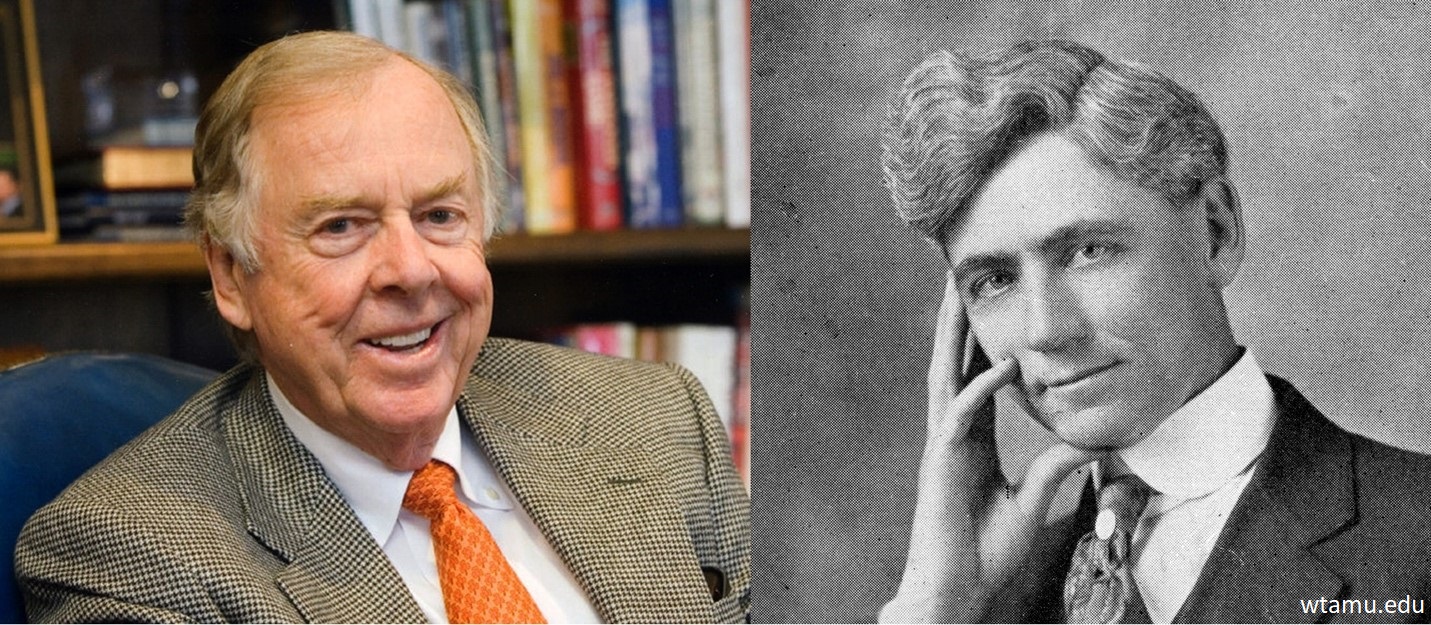
The passing of T. Boone Pickens, with his colorful relationship to West Texas A&M University, affords consideration of two great Panhandle pioneers. J. A. Hill became president of West Texas State Teachers College in 1918, having joined the campus in 1910 as one of the first faculty. The Normal School was forever changed by his presidential leadership culminating in 1948. Additionally, Hill contributed immeasurably to the welfare of the Texas Panhandle. Likewise, Pickens’ lifelong love of the petroleum industry in the United States changed both the industry and the nation. These men were fiercely independent thinkers—pioneers, afraid neither of challenge nor progress.
On April 12, 1935, President Hill addressed the Panhandle-Plains Historical Society. He reflected on the nature of being a pioneer: “The pioneer, wherever found, is self-reliant of necessity. Likewise, he was courageous because he was habitually meeting situations from which he cannot run away. He was tenacious and determined because it takes such qualities to rest victory from the forces which everywhere opposed him. He was resourceful because he was compelled to invent most of the means and instruments that he used in his daily work. The pioneer develops those fine qualities of life that make them stand out as a useful and constructive citizen.”
The pioneer spirit endures—we hope. Pickens personified Hill’s perceptions. Each was permeated with pure Texas DNA.
Self-reliance, the cornerstone of Hill’s observation, reinforces Ralph Waldo Emerson’s simple dictum, “Trust thyself: every heart vibrates to that iron string.” In an interview with American Business Magazine Pickens was asked, “Do you think being a cowboy is part of what it takes to be a good entrepreneur?” He replied, “I always say that an MBA will tell you to take the least amount of risk with the greatest opportunity for return. Well, that’s good. But if you put more of your own money in, you get a better return too, and that has worked well for me.” Both pioneers steadfastly determined to do their best in service to big ideas.
Bill George said in Forbes, “Courageous leaders lead with principles—their True North—that guide them when pressure mounts.” Hill’s courage began the liberation that allowed West Texas State Teachers College to eventually become a university. Likewise, Pickens pronounced the power of purposeful planning in a Business Insider collection of Booneisms. Pickens recalled his dad’s advice on the occasion of his induction into Sigma Alpha Epsilon fraternity: “A fool with a plan can beat a genius without one.” A plan with purpose requires courage. Shuck timidity.
Hill observed that pioneers were “tenacious and determined.” Nancy Eberhardt reports in Forbes, “…when I ask leaders about their single greatest factor for success, I consistently hear some variation of tenacity. Hanging in there. Going toe-to-toe. Sticking with it.” Hill had tenacity. Currently, the average tenure of a college president is about five years. Hill tirelessly transformed a campus over three decades. Pickens had legendary tenacity. His conviction about the importance of natural gas, both to the petroleum industry and indeed to the independence of our nation never waned. Referring to the formation of BP Capital in Leaders Magazine Pickens was asked, “Will there be a point when you feel the energy you put into this fight will have paid off?” Pickens said, “I think I’ve gotten my money’s worth. We have been successful with the Pickens Plan. We’ve educated the country on energy, and the national security and economic risks tied to OPEC oil.” Tireless tenacity.
Resourcefulness, the capstone of Hill’s pioneering persona positioned his university on the cusp of innovation with a Texas-sized regional focus. Resourcefulness is given life when self-reliance is added to courage and guided by tenacity. In the American Business Magazine interview, Pickens shared, “This business comes with a great amount of risk. It’s expensive to drill dry holes. I drilled more dry holes than anybody you will ever meet.”
Oddly, Pickens owned a form of humility. Hill, too. All pioneers have it. Pickens was not usually defined as a humble man, but he swallowed pride for progress. Pioneers do that. He led the move to adjoin West Texas State University to The Texas A&M University System. Two other systems were queried. One said, “No, but thanks.” The other, to this day, never even replied. In spite of being cut from A&M’s basketball program as a kid and losing his $25 scholarship, he worked diligently as Chairman of the Board of Regents of West Texas State University to arrange its marriage to The Texas A&M University System. Progress was more important than pride. He indelibly marked both the Panhandle and the University.
He did it because it was the right thing to do. He did it because Pickens, like Hill, was a remarkable Panhandle pioneer.
Two true Texans.
Walter V. Wendler is President of West Texas A&M University. His weekly columns are available at http://walterwendler.com/.



